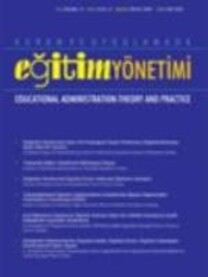Ortaöğretim Öğrencilerinin Öğrenme Stillerinin İncelenmesi
Bu araştırmanın amacı, ortaöğretim öğrencilerinin öğrenme stillerini belirlemektir. Araştırma için gerekli olan veriler D. Kolb tarafından geliştirilen “öğrenme stilleri envanteri” ile toplanmıştır. Araştırmanın örneklemi 763 öğrenciden oluşmaktadır. Veriler varyans analizi, LSD testi ve Ki kare yöntemi kullanılarak analiz edilmiştir. Öğrenme biçimleri ve bileşenleri açısından yapılan analizde öğrencilerin alanlarına göre soyut kavramsallaştırma öğrenme biçimi ile Soyut Kavramsallaştırma-Somut Yaşantı (SK-SY) öğrenme bileşenine ilişkin ortalama puanları arasında gözlenen fark önemli bulunmuştur. Fen ve sosyal alanlardaki öğrencilerin soyut kavramsallaştırma, Türkçe-matematik ve mesleki alanlardaki öğrencilerin ise aktif yaşantı öğrenme biçimini daha fazla tercih ettikleri saptanmıştır. Öğrencilerin alanları ile öğrenme stilleri arasında önemli fark gözlenmemiştir. Ancak, öğrencilerin çoğunluğunun (%43.1) ayrıştıran öğrenme stilini benimsedikleri saptanmıştır.
Anahtar Kelimeler:
öğrenme stilleri , öğrenme biçimleri , yaşantısal öğrenme teorisi
An İnvestigation of The Learning Styles of Secondary School Students
The purpose of this study is to investigate the learning styles of secondary school students. The data for this study was collected by means of the “Learning Styles Inventory”, developed by D. Kolb. The research sample consisted of 763 students. The data were analyzed by analysis of variance, LSD test and Chi-square. The results of the analysis performed to find out the learning modes and components revealed that the difference between the students' scores of abstract conceptualization learning style and their mean scores of abstract conceptualization-concrete experience (AC-CE) learning components was important. It was determined that the students of science and social studies preferred abstract conceptualization whereas the students of Turkish-Mathematics and vocational departments preferred active experimentation learning style. No significant difference was observed between the students' branches and their learning styles. However, it was concluded that most of the students (%43.1) adopted the converger learning style.
Keywords:
learning styles , learning modes , Kolb’s experimental theory,
- ISSN: 1300-4832
- Yayın Aralığı: Yılda 4 Sayı
- Başlangıç: 1995
- Yayıncı: Pegem Akademi Yayıncılık Eğitim Danışmanlık Hizmetleri Tic. Ltd. Şti.
Sayıdaki Diğer Makaleler
Mesleki Grup Rehberliğinin Benlik ve Meslek Kavramlarının Bağdaşımına Etkisi
Denetim Odaği Ölçeğinin Geçerlik ve Güvenirlik Çalışması
Ortaöğretim Öğrencilerinin Öğrenme Stillerinin İncelenmesi
Örgüt Kültürü Çalışmalarında Yönetsel Yaklaşımlar
Öğretmenlerin İş Başında Yetiştirilmesinde Okul Yöneticisinin Rolü
İzzet ÖZDEMİR, İlköğretim MÜFETTİŞİ
Üniversite Öğrencilerinin Zaman Yönetimleri ile Akademik Başarilari Arasindaki İlişki
